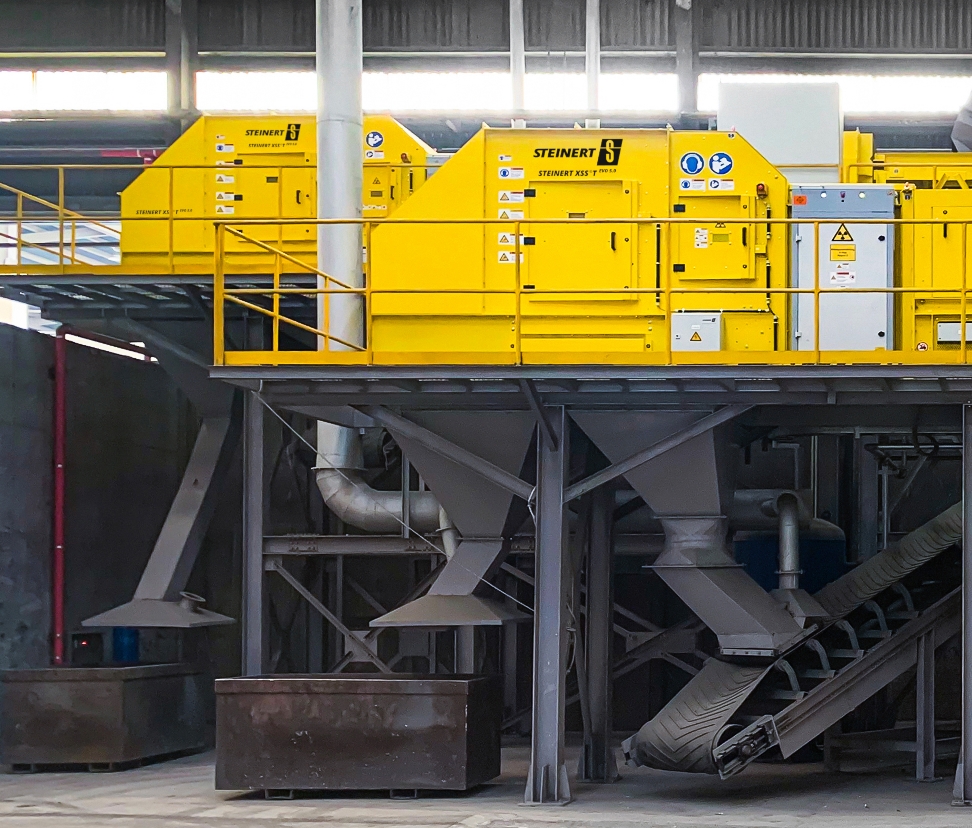

































































Due to the soaring demand for household waste sorting, recovering valuable materials from waste requires an economic and competitive approach. We can supply cutting-edge, automated sorting equipment to recover raw and high-value materials for recycling.
Magnetic and sensor-based technology separate metal and plastics, including PE, PP, PET, and PS. Induction sorting detects stainless steel and residual metals. Near-infrared sorting separates paper, cardboard and wood. We can also provide systems for sorting flat objects, such as paper or types of film, and for detecting black or dark-coloured objects.


































































As landfill costs rise and the need for high-quality secondary raw materials grows, the Construction and Demolition (C&D) waste market is thriving. We can supply equipment to recover recyclable elements from construction and demolition waste.
Magnet technology and sensor-based sorting separate metals, wood, paper, and plastics. Induction sensors detect and sort stainless steel and complex metal compounds. Wood, paper and plastics can be sorted using NIR and hyperspectral imaging technology (HSI). We can also provide systems to sort inert mineral construction materials to reduce disposal volume or increase product yield.


































































Effective separation of untreated wood and solid wood from wood-based materials can result in high-quality raw materials and a lucrative revenue stream. We supply cutting-edge solutions and sensors, including detecting and removing contaminants from stainless steel.
Overhead suspension magnet units can separate ferromagnetic iron parts from fresh wood and wood waste. Electromagnetic or permanent magnetic drums and head pulleys can separate ferrous metals. Non-ferrous metals can be sorted using eddy-current pulses. NIR technology and x-ray transmission detection can separate plastics and other waste materials from wood chips.


































































Millions of tonnes of plastic are needed for fabrication each year. Accurate sorting of plastic flakes and PE, PP, PS, PET and PVC to achieve pure polymers without impurities is a complex process. We can supply a range of high-efficiency solutions and equipment, including colour sorting systems and metal separators.
Contaminant-free plastic separation can be achieved with near-infrared and BlackEye technology for dark plastics. Magnetic contaminants can be pre-sorted using overhead suspension unit magnets and magnetic head pulleys. Non-ferrous and heavy metals can be separated efficiently using eddy-current separators.


































































Sorting black plastic from general waste relies on specialist technology. We can supply state-of-the-art plastic sorting systems to detect black plastics. We can also provide advanced air-flow technology for sorting flat and lightweight dark materials.
The pure-grade separation of black polyolefins into constituent parts, such as PE, PP and PS, allows for the replacement of polymer granulates with high-quality recyclates. Plastic residues can be converted into new products. Recycled plastics dramatically reduce CO2 emissions needed to produce new plastics, contributing to a more sustainable future.


































































Energy sources are in demand, and the supply of refuse-derived fuel (RDF) is a solution. RDF is typically produced from specific sorted plastics from various waste sources and can result in a profitable revenue stream. Sorting commercial waste requires advanced solutions. We can supply waste-sorting technologies.
Magnetic units and metal separators sort and separate different materials, including metals and plastics. Near-infrared technology accurately sorts plastics. Steel and non-ferrous metals can be recovered using self-cleaning overhead suspension magnets and separators. Organic materials and plastics can be sorted using NIR-based hyperspectral imaging.


































































Used paper and paperboard are valuable resources for the global paper industry, offering environmental and economic benefits compared to using fresh pulp. Materials often contain contaminants like plastics, metals, textiles, glass, or minerals, requiring specialist sorting processes. We provide advanced solutions for sorting paper and paperboard from waste.
Magnets can be used to separate ferrous metals, and non-ferrous metals can be sorted automatically using an eddy-current system. Specialist units can efficiently remove foreign substances from plastics and textiles, using NIR sensors to detect and sort visible and dark contaminants.


Looking for a technical solution, parts or training for your recycling operations?
We share updates on projects, equipment, and key developments that are influencing the metal and wood recycling sector.